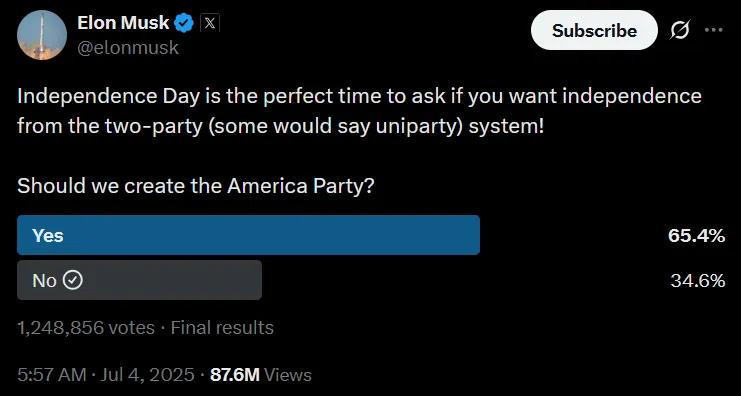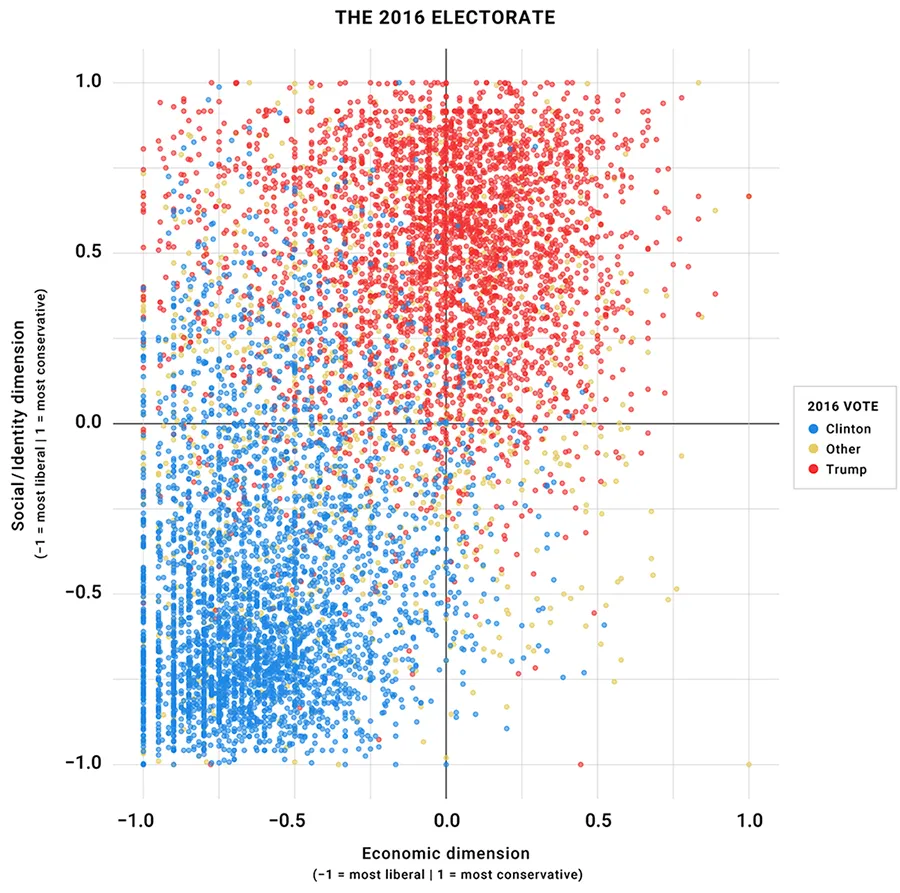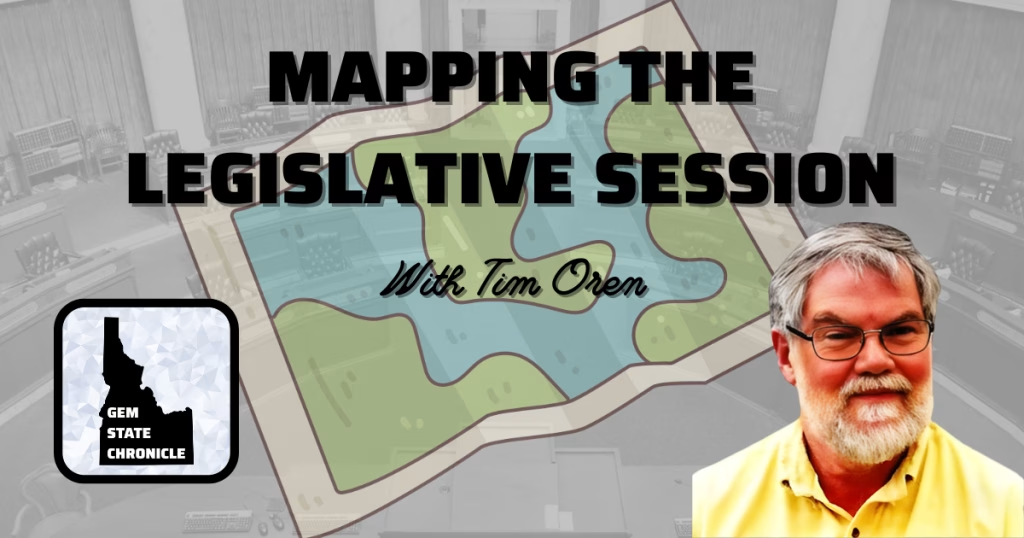After expressing frustration with the lack of significant spending cuts in H.R. 1, the One Big Beautiful Bill, Elon Musk announced over the weekend the formation of a new political party. His so-called “America Party” is intended as a centrist alternative to what he and others often call the “Uniparty.” A Musk fan account posted a proposed platform for the new party, which Musk himself retweeted, presumably signaling his endorsement:
-reduce debt, responsible spending only
-modernize military with ai/robotics
-pro tech, accelerate to win in ai
-less regulation across board but especially in energy
-free speech
-pro natalist
-centrist policies everywhere else
Musk’s announcement followed his usual pattern: of posting a Twitter poll asking what he should do next. Nearly 2-to-1, users supported the idea of a third party.

Of course, many were quick to point out that the poll made no distinction between American voters and foreign citizens. According to the World Population Review, over a billion internet users are from China, 881 million from India, and 311 million from the United States. One of Musk’s most vocal supporters is Ian Miles Cheong, an influencer based in Malaysia.
Another influencer known as DogeDesigner posted a meme asking, “Which Way, Western Man?” with both the GOP and Democrats leading to doom and gloom, while a proposed America Party led to a bright castle. (This is a common meme format, and the phrase itself is a familiar refrain.)
However, X’s Community Notes clarified that DogeDesigner is Indian, not American—and therefore not even Western:

Unlike the MAGA movement, which generally wants to see immigration curtailed, Musk has publicly called for increasing H-1B visas, many of which go to workers from India. It seems doubtful that a South African expat who advocates for more high-skilled immigration and claims support from a global diaspora of tech enthusiasts can credibly claim to speak for the forgotten men and women of America, but I suppose anything is possible.
Pseudonymous Twitter user FischerKing noted that Ross Perot’s 1992 campaign succeeded in part because it combined budget hawkishness with economic nationalism:
Ross Perot was somewhat successful with an austerity message because he combined it with nativism. He warned openly about the dangers of NAFTA, defended American workers, railed against outsourcing. Had he run only on cutting benefits he would not have got very far.
Regardless of Musk’s intentions or political views, the viability of a third party in America was answered long ago. More than three years ago, I addressed similar conservative hopes of forming a MAGA party after the 2020 election. I concluded then—and still believe—that working within the Republican Party offers a far better path:
Starting a third party is tremendously hard work, so why reinvent the wheel? The GOP has name recognition, an existing power structure, and built-in access to tens of millions of voters. While I understand the desire to start fresh, we will be far more effective changing the Republican Party from within than attacking it from without. All you have to do is show up. Attend your legislative district meetings. If your precinct does not have a committeeman, then file to run – you will probably be unopposed. Get enough like-minded people in these positions and you can decide who chairs your committee, who represents you in the state party, and what measures are adopted at the state level. You can also influence who runs for office under the Republican banner, or even run yourself!
Legislative results in Idaho over the past two election cycles have proven my point. There are dozens more conservatives in office today than when I wrote that post, while various third parties remain on the fringes.
Numerous historical examples, from Theodore Roosevelt in 1912, George Wallace in 1968, and of course Perot in 1992 show that there is no path to victory outside the two party system. Some point to the rise of the Republican Party in the 1850s, but that was a very different era. Today’s parties possess enormous structural power that is nearly impossible to replicate. Starting a new party now would be like trying to build a competitor to Amazon or YouTube from scratch.
Yet Elon Musk thinks he’s cracked the code, drawing on ancient Greek history for inspiration:
The way we’re going to crack the uniparty system is by using a variant of how Epaminondas shattered the myth of Spartan invincibility at Leuctra:
Extremely concentrated force at a precise location on the battlefield.
But there are signs Musk isn’t entirely serious. On Sunday, he asked where to hold the first America Party congress, sounding more like a child planning a tea party than a political organizer. If he follows his usual pattern, he’ll get bored and move on to other projects soon enough.
More seriously, he reposted a tweet by Scott Adams suggesting this might not be about a third party at all, but rather a way to exert influence within the existing system:
If you are an “analogy thinker,” you compare Musk’s new America Party to Ross Perot’s third-party run and conclude it is bad for Republicans.
But that would only be the case if Musk someday backs an American Party candidate for president, and I don’t see that in his plan.
If Musk only backs individual Senators and Representatives for his new party, as he has hinted, all he does is give Republicans a new way to get past politics to solutions the country wants and needs, such as deficit reduction.
The Beta version might be buggy, so expect bumps.
The core problem with Musk’s calculus is that he seems to live in a bubble where spending cuts—including entitlement reform—are assumed to be a top priority for 80% of Americans. That’s simply, and unfortunately, not true. Very few voters, even among Republicans, support cutting Social Security or Medicare—two of the largest federal budget items.
In truth, fiscal austerity has never been a winning issue in American politics. Republican wonks and pundits may love it, but voters don’t. John McCain and Mitt Romney made budgetary issues some of their top priorities in 2008 and 2012, and both lost. In 2016, Donald Trump succeeded in part by rejecting that orthodoxy, winning over many disaffected Obama voters by promising to protect entitlements while focusing on jobs, borders, and American strength.

Elon Musk’s proposed America Party would appeal to the bottom right quadrant of the graph—budget hawks who don’t care about issues related to society or identity. But what made Trump’s 2024 campaign effective? He didn’t promise spending cuts, but mass deportations, peace abroad, jobs at home, law and order, and pushback against radical gender ideology.
What Musk seems to miss is that Trump’s MAGA movement is already the third party many were waiting for. Rather than marginalizing himself, as Perot did, Trump chose the smarter path—reshaping the Republican Party from within. He captured the 80% issues that previous GOP leaders wouldn’t touch, and in doing so began a long-term realignment of our political system. Today’s Democratic Party is openly the socialist party, the globalist party, the identity grievance party, and the totalitarian party. Any opposition to this radical platform—any support for free markets, America First, equality under the law, and freedom—must come from within the GOP.
If Musk truly wants to make a difference, his best option is to use his influence to promote fiscally responsible candidates inside the Republican Party. Attempting to go outside the two-party system will only throw a lifeline to the Democrats—arguably at their weakest point since the post–Civil War era.
Let’s not forget: Democrats were prosecuting Musk and his companies before 2025, and their partisans have spent this year burning and vandalizing Teslas. Would he really be so foolish as to give them the rope they’ll surely use to hang him?
Gem State Chronicle is a reader-supported publication. To receive new posts and support my work, consider becoming a free or paid subscriber.
About Brian Almon
Brian Almon is the Editor of the Gem State Chronicle. He also serves as Chairman of the District 14 Republican Party and is a trustee of the Eagle Public Library Board. He lives with his wife and five children in Eagle.













